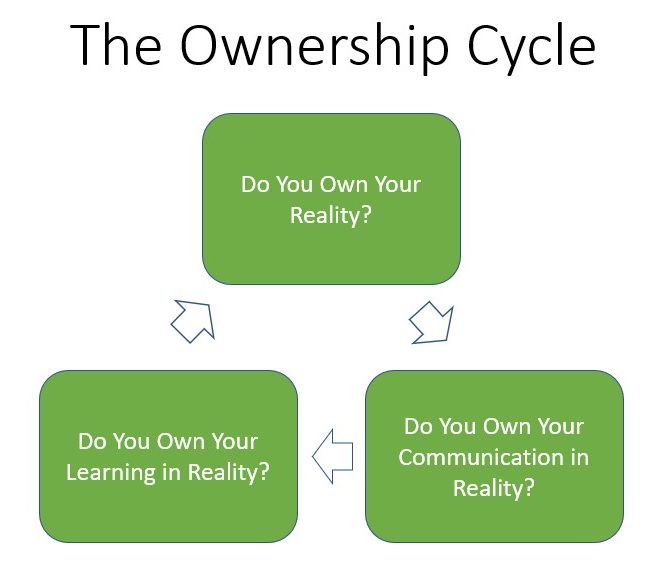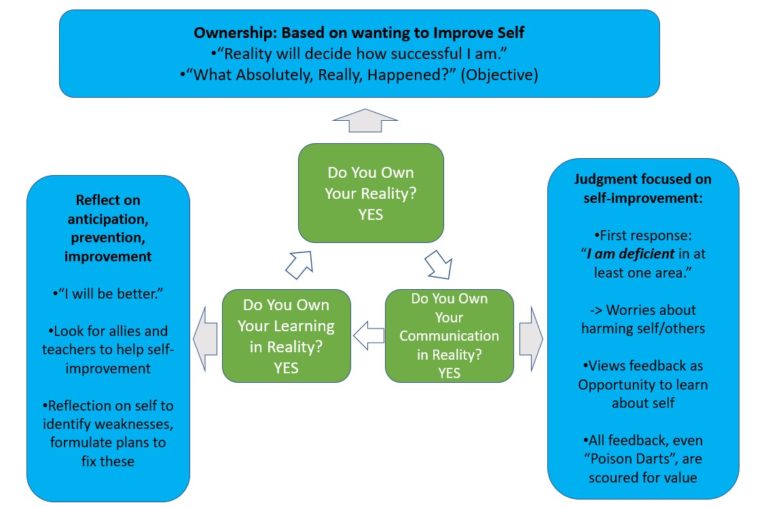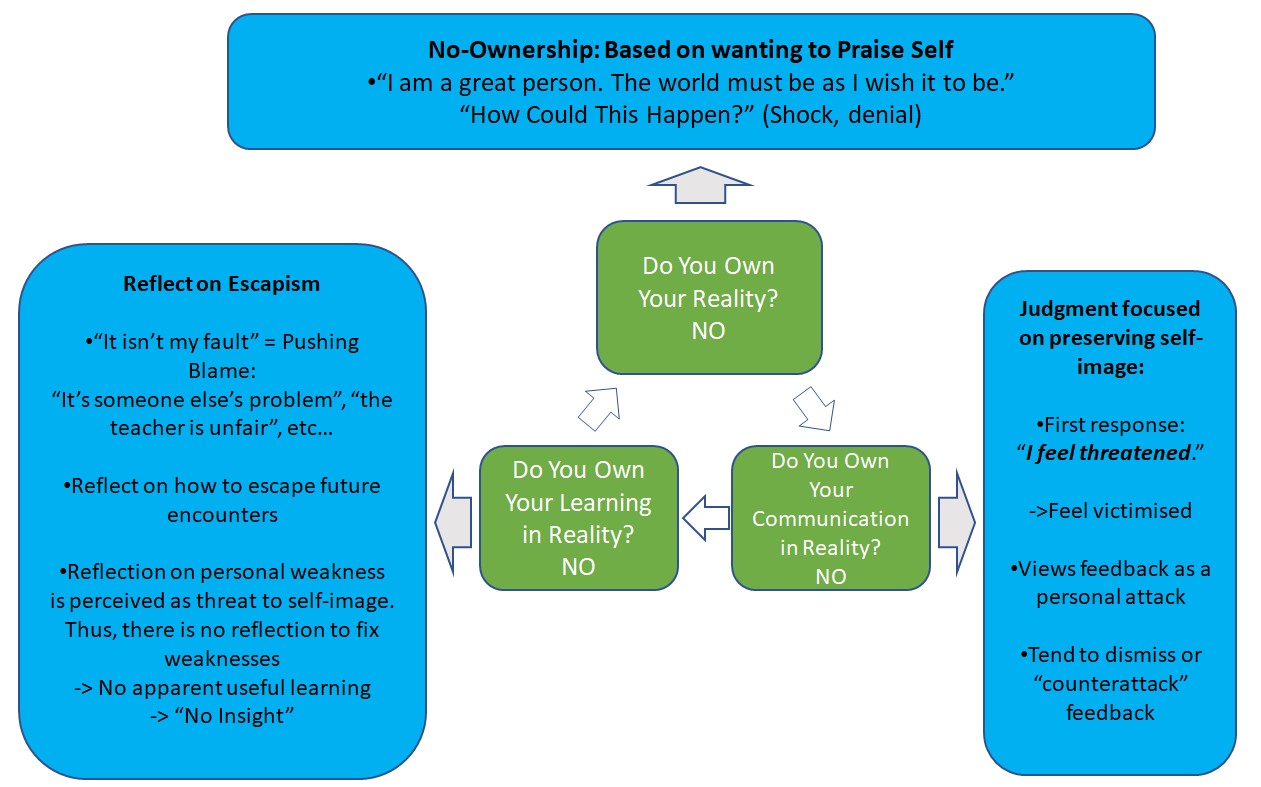The Ownership Cycle and self-regulated learning
Published online: 2 January, TAPS 2019, 4(1), 65-68
DOI:https://doi.org/10.29060/TAPS.2019-4-1/CS2047
Jian Yi Soh
Department of Paediatrics, Khoo Teck Puat-National University Children’s Medical Institute, National University Hospital, Singapore
I. INTRODUCTION
Teachers in various settings worldwide meet with a variety of learners. Some are adept and master their lessons quickly; some less so; and some have persistent difficulties with their lessons. The difficulties can extend beyond the academic; conduct, professionalism and resilience are all important, especially in undergraduate and postgraduate learners. Inability to accept poor results, to admit failure so as to learn from it, can create learners who become withdrawn and resistant to constructive feedback and sincere attempts to help them. “No insight” and “unmotivated” are common terms used in the hallways and discussion rooms to describe these learners. Based on these twin assumptions, teachers strive to extend more help, more resources and more constructive feedback to these learners, and often find that there is little or no improvement despite the vast amounts of energy and time expended.
Although lack of insight may contribute to poor performance, the presence of insight does not correlate with good performance (Carr and Johnson, 2013). It can be deduced that having insight is a requirement for good performance, but insight alone is insufficient for good performance. There are likely other factors, such as behaviour, that may determine final performance.
It is commonly acknowledged that self-regulated learning is an important trait for learners to acquire(Boekaerts, 1997). Taking charge of one’s life, one’s learning, one’s mistakes and learn from these, and be able to balance and sustain that learning journey long-term after leaving formal school. There is great interest in instilling this in learners, just as it is acknowledged that doing so is a complex process that is not yet fully understood(Boekaerts, 1997; Cho, Marjadi, Langendyk, & Hu, 2017).
Each of us observes or senses information during a learning journey. What we choose to acknowledge and observe, is influenced by what drives us. We then react to others in a particular way, often based on the same driving force. What we then choose to learn, also seems patterned on that driving force. The driving force can be framed using 3 questions that follow each other sequentially (Figure 1). This creates a self-perpetuating cycle that, though modifiable by extenuating or special circumstances, is often subconscious and consistent. One can categorise effective self-regulated learners into a particular cycle, and those without effective self-regulated learning in another cycle.

Figure 1. Key questions framing the Ownership Cycle
The driving forces behind the two Cycles appear to be mutually exclusive, which in turn lead to mutually exclusive patterns of behaviour. One could deem effective self-regulated learners to be in an “Ownership Cycle” of behaviour and learning, wherein there is a constant drive to observe, be humble, acknowledge mistakes and learn from them, and seek help appropriately (Figure 2).

Figure 2. The Ownership Cycle

Figure 3. The No-Ownership Cycle
The other group of learners can be seen to be in a “No-Ownership Cycle” of behaviour and learning. This Cycle is driven by a fixation on personal pride and ego. The “No-Ownership Cycle” creates a reflexive, invisible force field of rejection of the outside world, around the learner whenever his or her self-image is threatened. This force field gives the learner a false sense of security and comfort. From the perspective of those outside the force field, when the force field comes up, these learners may exhibit various types of anti-social behaviour, and appear impervious to reality and useful help. This in turn means the learner learns nothing or the wrong lessons, which lead to a state of perpetual under-achievement, failure and frustration. It also lends the impression of this learner being “unmotivated” and “having no insight” to everyone else who is looking in on this learner, from outside this force field (Figure 3).
Insight into the driving forces behind the two Cycles illustrates the reasons that teachers worldwide struggle with the “No-Ownership Cycle” learners. Attempts to provide help simply bounce off the No-Ownership force field, often because it is an easy and common mistake to inadvertently activate the force field – which then blocks out all subsequent effort the teacher devotes to trying to help the struggling learner. By altering the fundamental driving force in each learner, it may be possible to shift them into the healthy Ownership Cycle – where they then take charge of themselves and begin improving. To do so, however, means that the teacher must know what the two Cycles are, know how to explain it to a learner; and be able to do so without activating the force field of No-Ownership.
Medical residency is no different. Some learners struggle with poor outcomes and patient complaints. Being able to acknowledge their shortcomings, learn from these and move forward because they have accepted and are able to “let go” of the negative emotions from the incident, are all important skills for doctors. The same two Cycles come into play here.
II. INTERVENTION
A 6-step non-confrontational exploratory intervention was derived from insights into the two Cycles, with the intention of helping learners in difficulty. The 6 steps involve:
- Approaching the No-Ownership learner without activating the force field.
- Finding out how the learner observes and reacts. This has the second useful function of allowing them to voice aloud their frustrations with their difficulties, and with previous encounters where they felt threatened.
- Exploring their needs, getting them to ground themselves by prioritizing what they need instead of all the things they want.
- Going over the healthy Ownership Cycle using any incident(s) they described and with the Needs firmly in mind that they themselves voiced in step 3. Once provided this perspective, the learner realizes what else is needed to achieve their need.
- Coming to mutual agreement about what behavioural change is needed for these incidents so as to help them achieve their needs.
- Follow-up to sustain the change, intermittently over the next few months.
This intervention was used on residents who were having difficulties achieving competence (as judged by Faculty), letting go of past mistakes, worrying about what others think about them to the point of distraction and stress, and/or unhappy at their perceived arbitrariness of the assessments or faculty who provided them feedback previously on incidents with poor patient outcomes.
The outcome has been uniformly positive in terms of accomplishing its objective: getting the resident to cope with the above issues, as well as preventing any further repetition of such difficulties ever since.
III. STRENGTHS AND LIMITATIONS
One strength of this intervention is that it provides an answer to a dilemma that plagues teachers and learners worldwide, and at a fraction of the time and energy that teachers spend in futility trying to help learners in difficulty. The 6 steps are universal and simple enough that a skilled coach in any setting could use them. Another strength is that it applies to “average” learners as well. Even “average” learners have moments where they slip into the “No-Ownership Cycle”, and in those moments they react poorly and learn nothing (or the wrong lessons). A third strength is that these 6 universal steps also apply to any human being who needs to learn something when there is a poor outcome in any setting, including personal relationships or self-improvement.
The limitations are that the 6 steps do require knowledge of what the two Cycles are; the coach needs to maintain a non-judgmental, non-confrontational approach throughout the encounter; and effort is needed to follow up. Missing any of the 6 steps means only temporary gains or outright failure of this intervention. In addition, as this intervention has only been recently created and been used on a small number of residents in difficulty, it remains to be proved on a large scale.
IV. MOVING FORWARD
Pilot studies should be carried out to refine the intervention, before considering it for large-scale implementation.
Notes On Contributor
Dr Soh Jian Yi conceived this construct and intervention, wrote the manuscript, and agreed to its publication in its final form.
Funding
No funding is involved for this paper.
Declaration of Interest
There is no conflict of interest, including financial, consultant, institutional or otherwise for any of the authors involved in this manuscript.
References
Carr, S. E., & Johnson, P .H. (2013). Does self-reflection and insight correlate with academic performance in medical students? BioMed Central Medical Education, 13, 113-117. https://doi.org/10.1186/1472-6920-13-113.
Boekaerts, M. (1997). Self-regulated learning: A new concept embraced by researchers, policy makers, educators, teachers, and students. Learning and Instruction, 7(2), 161-186. https://doi.org/10.1016/S0959-4752;(96)00015-1.
Cho, K. K., Marjadi, B., Langendyk, V., & Hu, W. (2017). The self-regulated learning of medical students in the clinical environment – A scoping review. BioMed Central Medical Education, 17(1), 112-124. https://doi.org/10.1186/s12909-017-0956-6.
*Soh Jian Yi
Email: jian_yi_soh@nuhs.edu.sg
National University Hospital
Department of Paediatric Medicine
1E Kent Ridge Road,
NUHS Tower Block Level 12,
Singapore 119228
Announcements
- Best Reviewer Awards 2025
TAPS would like to express gratitude and thanks to an extraordinary group of reviewers who are awarded the Best Reviewer Awards for 2025.
Refer here for the list of recipients. - Most Accessed Article 2025
The Most Accessed Article of 2025 goes to Analyses of self-care agency and mindset: A pilot study on Malaysian undergraduate medical students.
Congratulations, Dr Reshma Mohamed Ansari and co-authors! - Best Article Award 2025
The Best Article Award of 2025 goes to From disparity to inclusivity: Narrative review of strategies in medical education to bridge gender inequality.
Congratulations, Dr Han Ting Jillian Yeo and co-authors! - Best Reviewer Awards 2024
TAPS would like to express gratitude and thanks to an extraordinary group of reviewers who are awarded the Best Reviewer Awards for 2024.
Refer here for the list of recipients. - Most Accessed Article 2024
The Most Accessed Article of 2024 goes to Persons with Disabilities (PWD) as patient educators: Effects on medical student attitudes.
Congratulations, Dr Vivien Lee and co-authors! - Best Article Award 2024
The Best Article Award of 2024 goes to Achieving Competency for Year 1 Doctors in Singapore: Comparing Night Float or Traditional Call.
Congratulations, Dr Tan Mae Yue and co-authors! - Best Reviewer Awards 2023
TAPS would like to express gratitude and thanks to an extraordinary group of reviewers who are awarded the Best Reviewer Awards for 2023.
Refer here for the list of recipients. - Most Accessed Article 2023
The Most Accessed Article of 2023 goes to Small, sustainable, steps to success as a scholar in Health Professions Education – Micro (macro and meta) matters.
Congratulations, A/Prof Goh Poh-Sun & Dr Elisabeth Schlegel! - Best Article Award 2023
The Best Article Award of 2023 goes to Increasing the value of Community-Based Education through Interprofessional Education.
Congratulations, Dr Tri Nur Kristina and co-authors! - Best Reviewer Awards 2022
TAPS would like to express gratitude and thanks to an extraordinary group of reviewers who are awarded the Best Reviewer Awards for 2022.
Refer here for the list of recipients. - Most Accessed Article 2022
The Most Accessed Article of 2022 goes to An urgent need to teach complexity science to health science students.
Congratulations, Dr Bhuvan KC and Dr Ravi Shankar. - Best Article Award 2022
The Best Article Award of 2022 goes to From clinician to educator: A scoping review of professional identity and the influence of impostor phenomenon.
Congratulations, Ms Freeman and co-authors.









